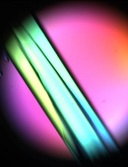
Protein crystallisation has been used for decades to determine the structure of proteins. What is new, however, is technical protein crystallization for purification or final formulation on an industrial scale as an alternative to chromatography. Since the molecular mechanisms of protein crystallisation can only be described incompletely so far, crystallisation conditions can only be determined empirically with great experimental expense. Despite this high effort, many technically relevant proteins often cannot be crystallized.
This research project aims to investigate which strategies can be used to enable the technical crystallization of proteins in a controlled manner by modeling-based protein engineering. Based on preliminary work with a related enzyme, individual amino acids are to be exchanged at the presumed crystal contact patches in order to specifically enhance interactions in an analogous manner. On the other hand, the knowledge gained from this work on generalizable principles of protein crystallization will be applied to two hitherto non-crystallizable proteins and thus evaluated.
In this way, the empirical procedure for the identification of suitable crystallization conditions of proteins, which has been standard practice to date, is to be supplemented by a modeling-based approach. In interdisciplinary collaboration, methods from molecular biology and bioprocess engineering (this research project) will be combined with methods from theoretical biophysics (research project of Daniel Bischoff).
Publikationen
- Wegner CH, Eming SM, Walla B, Bischoff D, Weuster-Botz D, Hubbuch J (2024): Spectroscopic insights into multi-phase protein crystallization in complex lysate using Raman spectroscopy and a particle-free bypass. Front Bioeng Biotech 12: 1397465.
- Walla B, Bischoff D, Corona Viramontes I, Montes Figueredo S, Weuster-Botz D (2023): Recent advances in the monitoring of protein crystallization processes in downstream processing. Crystals 13: 773.
- Bischoff D, Walla B, Weuster-Botz D (2022): Machine-learning based protein crystal detection for monitoring of crystallization processes enabled with large-scale synthetic data sets of photorealistic images. Analyt Bioanalyt Chem 414: 6379-6391.
- Walla B, Bischoff D, Janowski R, von den Eichen N, Niessing D, Weuster-Botz D (2021): Transfer of a rational crystal contact engineering strategy between diverse alcohol dehydrogenases. Crystals11: 975.
- Grob P, Huber M, Walla B, Hermann J, Janowski R, Niessing D, Hekmat D, Weuster-Botz D (2020) Crystal contact engineering enables efficient capture and purification of an oxidoreductase by technical crystallization. Biotechnol J 15: 2000010.